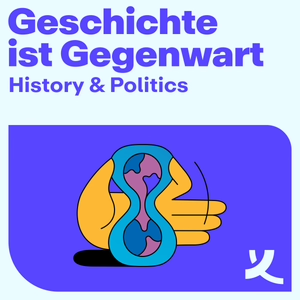
A New History of The Eastern Question
04/23/22 • -1 min
Previous Episode

Moriscos and the Early Modern Mediterranean
Mayte Green-Mercado hosted by Brittany White
| In 1609, King Phillip III of Spain signed an edict to expel a community known as the Moriscos from the Iberian Peninsula. The Moriscos were Muslims forcibly converted to Christianity during the 16th century, after Christian kingdoms displaced the last remaining Muslim rulers in Iberia. The persecution and erasure of the Moriscos following the Reconquista are well documented in the historiography, where alongside Iberian Jews, they appear as victims of the fall of Islamic al-Andalus. But in this episode of Ottoman History Podcast, we’ll explore what these events looked like through the eyes of the Moriscos themselves and study their roles as political actors in the momentous political shifts of the 16th century. In this conversation with Mayte Green-Mercado about her book Visions of Deliverance, we discuss the circulation of Muslim and crypto-Muslim apocalyptic texts, known as jofores; and how these texts were catalysts for morisco political mobilization against the Spanish crown. We chart the formal and informal networks of communication between Moriscos, the Ottoman Empire, and the broader Mediterranean world. And we reflect on the challenges and benefits of using biased sources like the records of the Inquisition alongside other material. « Click for More »
Next Episode

The Catastrophic Success of the Armenian Tanzimat
with Richard Antaramian hosted by Matthew Ghazarian | How did the Ottomans secure widespread buy-in for modernization projects across the empire's many geographies and communities? This episode explores that question through the experiences of Armenians in the Ottoman East. Our guest, Richard Antaramian, shares some of his research, which argues that Ottoman shared governance worked through networks of power that linked center to periphery and sustained relationships among notables of different confessions, classes, and locations. The Ottoman tax-farming system of the 18th century forged ties among central authorities, provincial notables, and Armenian financiers. As the Ottoman government embarked upon the modernizing reform projects of the late 1700s and 1800s, those forms of shared governence frayed. In the Ottoman East, the Armenian Patriarchate's attempts to enact new notions of reform saw major successes, with the establishment limited representative governance, a constitution, and new educational institutions. Yet, those successes came at the cost of weakening the ties between provincial Armenians and important power brokers like provincial notables and Kurdish tribal leaders. Ultimately, the Armenian Patriarchate's successes at reform translated into trouble for its newly-isolated flock in the empire's eastern borderlands. « Click for More »
If you like this episode you’ll love
Episode Comments
Generate a badge
Get a badge for your website that links back to this episode
<a href="https://goodpods.com/podcasts/ottoman-history-podcast-1200/a-new-history-of-the-eastern-question-20667928"> <img src="https://storage.googleapis.com/goodpods-images-bucket/badges/generic-badge-1.svg" alt="listen to a new history of the eastern question on goodpods" style="width: 225px" /> </a>
Copy




